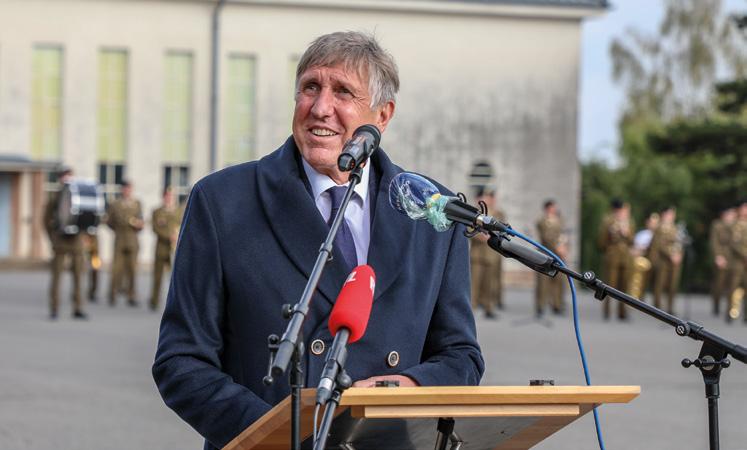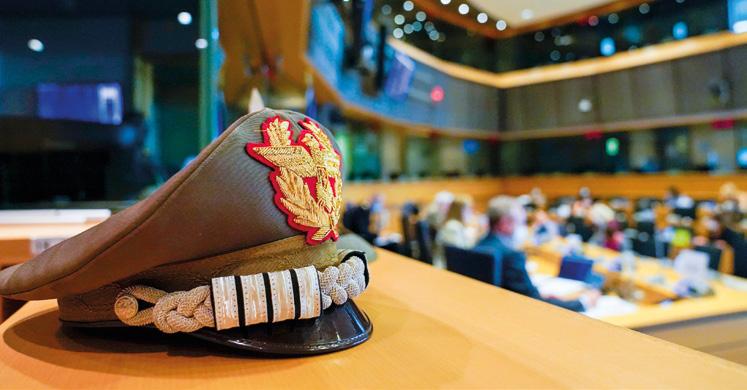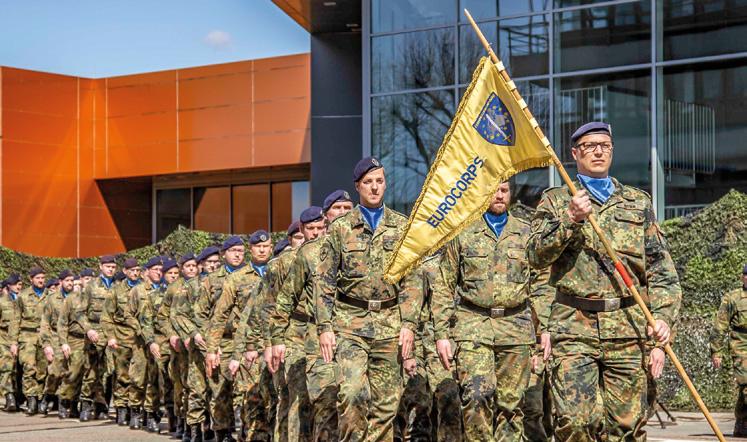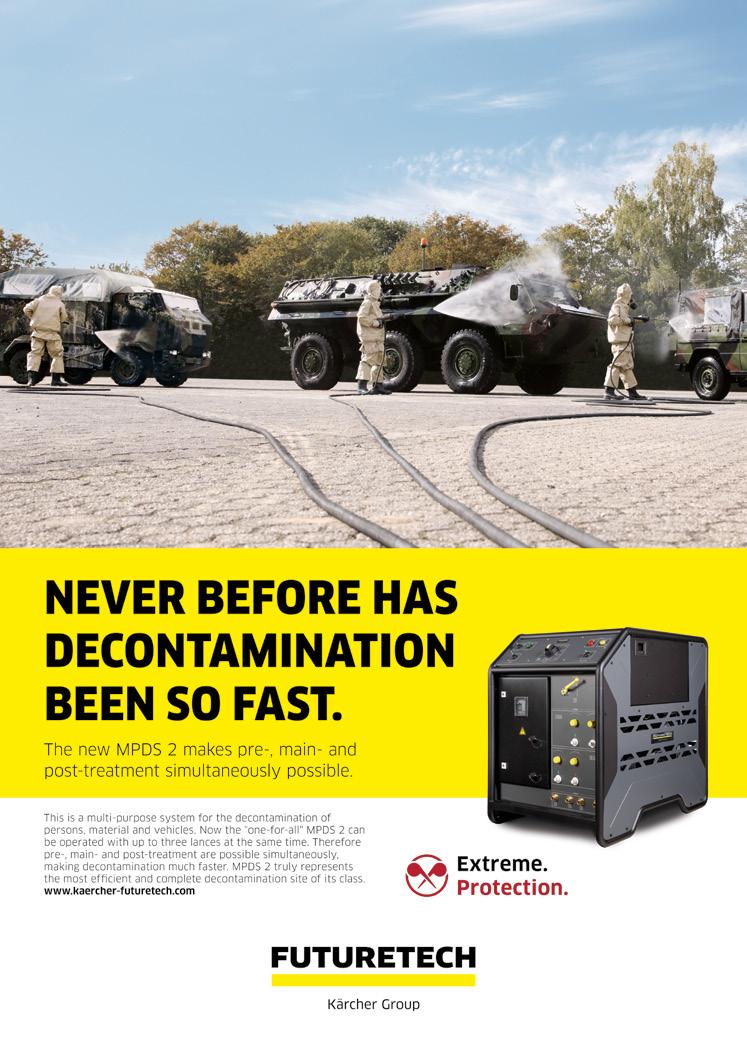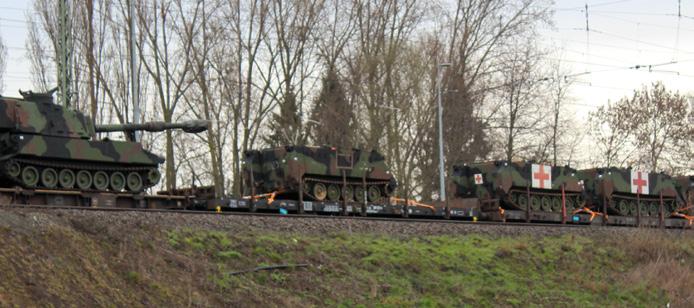
6 minute read
General Eberhard Zorn, Berlin
Improving our ability to act to ensure future security for and in Europe European Security and Defence – an operational perspective
by General Eberhard Zorn, Chief of Defence, Berlin
As Europeans, we have demonstrated solidarity with our partners and allies in the past months and supported each other in the fight against the coronavirus, including with capabilities of our armed forces. However, we must not allow these circumstances to draw attention away from the fact that our security is shaped by complex external threats beyond that. The pandemic has taught us that we must become more resilient at the European level, in the face of unexpected events. It has also taught us that we must improve the European Union’s military operational output.
A compass for the EU Global Strategy
In past years, our focus has been the development of common capabilities. This is, undoubtedly, an important area, albeit one where it can often take years before operational output becomes tangible. Regardless of this, we must continue to strengthen our ability to act in the short term wherever possible. To achieve this, we must be able to employ our existing forces more coordinately, more rapidly and thereby more effectively. Quick action is possible where there is a common will to act that is supported by functional structures and existing capabilities at the same time. We must identify and address the areas that we can and need to work on today in order to be able to successfully meet future challenges together. The world will not wait for us to feel ready to face its surprises. In light of the German Presidency of the Council of the European Union 2020, we have contributed ideas and initiated discussion regarding both areas. A project that will provide the European Union with a more common course of action within the CSDP is the Strategic Compass. It will operationalise the strategic priorities of the EU Global Strategy and thereby help the Union determine which threat it wants to and is able to meet and which means to use. All EU Member States are aware that this will require intensive dialogue. Naturally, each state assesses challenges based not only on its unique geographic location, but also on historic and political experience as well as its security culture. Within the scope of the Presidency of the Council of the European Union, Germany has therefore initiated a common 360-degree threat analysis that establishes the starting point for further dialogue and the basis for the development of the Strategic Compass. A greater understanding of what the European Union is able and willing to achieve within the framework of the CSDP contributes to an improvement of operational output. So do functional and reliable command and control structures.
Improving command and control structures
The EU has recently significantly strengthened its command, control and planning capabilities by establishing the Military Planning and Conduct Capability. But we must think ahead. This is why, within the scope of the German Council Presidency, we have worked to ensure the continuous improvement of the overall command and control structures of the European Union. From a German perspective, it is important to separate the existing levels of warfare into a strategic level which could develop based on the civilian and military structures in Brussels
on the one hand, and a clearly defined operational level with a number of headquarters on the other. This would increase the EU’s response capability from Brussels and conserve valuable resources in the Member States because some tasks would be performed centrally while the number of headquarters that require repeated certification for EU missions and operations would simultaneously be adjusted to correspond with the future level of ambition. This is an aspect we should keep in mind, not only in the EU, but in general. Enhancing interoperability and cooperation In many areas, tasks change hands, and the focus shifts too frequently. We create processes only to hand over the task to another headquarters once we have finally mastered it. In the EU Battle Group, the only unit exclusively earmarked and held ready for the CSDP, the path from training to certification is currently almost as long as the readiness phase. It must be ready to deploy at all times. For this reason, Germany has offered to extend the readiness phase from six months to one year when it assumes responsibility for the EU Battle Group again in 2025 in order to achieve greater balance between cost and benefit and to further enhance interoperability among forces. Likewise, improved coordination in international crisis management can bring us a little closer to reaching our goals. The Sahel is one example. Various organisations and nations conduct more than a handful of operations in the region. As opposed to cross-border terrorism, the mandated missions and operations often end at the relevant country’s border, which is why we must significantly improve the networking
aspect of our actions. To this end, Germany will integrate the training operation Gazelle – the Bundeswehr training special
operation forces in Niger – into the EU training mission in Mali as a first contribution to improved networking.
A more common course of action based on the Strategic Compass could not only positively affect action in CSDP oper-
ations, but also contribute to improved cooperation between the EU and NATO. Credible deterrence, which has once more been a priority for NATO since 2014, does not only require well equipped and interoperable armed forces that are actually capable of defending the Alliance territory against potential aggressors. It also requires a wider range of instruments, many of which can be found in the security toolbox of a European Union that focuses on integrated action.
NATO and EU complement each other
It is in our shared interest to expand cooperation in those fields that will support the realisation of objectives that the two organisations share. The EU and NATO are capable of complementing each other well. Examples include the “Military Mobility” PESCO project as well as the Multinational Medical Coordination Centre/European Medical Command in Koblenz, Germany. A concept for the storage of medical supplies was developed under the responsibility of the European Medical Command and the related tool is already in use. These latter examples, in particular, highlight that enhanced cooperation between NATO and the EU is important for those nations that are not part of both organisations
General Eberhard Zorn has been Chief of Defence of Bundeswehr (BW) since 2018. Born in 1960, he graduated from the BW University, Hamburg in business administration and attended from 1991 to 1995 the German and French General Staff courses in Hamburg and Paris. From 1999-2001 he was Commander Artillery Battalion 295 and deployed with SFOR as Operations Officer (G 3), HQ Multinational Division South-East, Mostar. He then took on various operational assignments, among others Deputy Chief of Staff Plans/Operations/Organization (G 3) at German Army Forces Command, Koblenz. After commanding from 2010-2016 Airborne Brigade 26 and then Response Forces Division, he headed two MOD Directorates (Forces Policy and Personal) in Berlin. at the same time. The breakthrough regarding the participation of non-EU nations in PESCO that was negotiated under the German Council Presidency only days ago will help further expand cooperation and thereby further improve the existing operational output. Strengthening Europe’s ability to act, in this case, does not constitute a weakening of NATO nor does it question NATO, which is works well and serves its purpose. Indeed, enhanced cooperation serves to improve both organisations’ ability to act. After all, this is our shared goal: to improve our ability to act to ensure future security for and in Europe.

